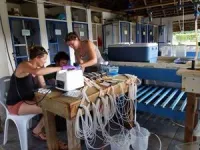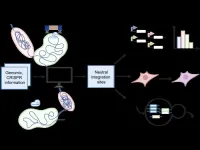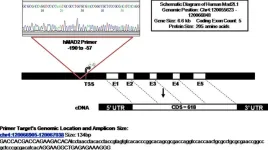(Press-News.org) On healthy reefs around the world, corals, algae, fishes and microbes live interconnected and in balance—exchanging nutrients, resources, and chemical signals. New research led by the University of Hawai‘i (UH) at Mānoa and and the Royal Netherlands Institute for Sea Research (NIOZ) revealed that when coral bleaching occurs, corals release unique organic compounds into the surrounding water that not only promote bacterial growth overall, but select for opportunistic bacteria that may further stress reefs.
“Our results demonstrate how the impacts of both short-term thermal stress and long-term bleaching may extend beyond coral and into the water column,” said Wesley Sparagon, co-lead author, postdoctoral researcher in the UH Mānoa College of Tropical Agriculture and Human Resources and previous doctoral student with the UH Mānoa School of Ocean and Earth Science and Technology (SOEST).
The research team, which included scientists from UH Mānoa, NIOZ, Scripps Institution of Oceanography and University of California, Santa Barbara, conducted experiments on bleached and unbleached corals gathered during a bleaching event in Moorea, French Polynesia in 2019.
“Although coral bleaching is a well-documented and increasingly widespread phenomenon in reefs across the globe, there has been relatively little research on the implications for reef water column microbiology and biogeochemistry,” said Craig Nelson, senior author on the study and professor in SOEST.
In a heating experiment, the team determined that both thermally stressed and bleached coral exude a different composition of organic matter in response to thermal stress as compared to unbleached coral. These unique compounds fed microbial communities in the surrounding water, causing an increase in their abundance.
“Interestingly, the microbes responding to bleaching coral exudates were distinct from those grown on healthy coral exudates,” said Sparagon. “And, there were higher abundances of fast-growing opportunists and potential pathogens. The growth of these microbial communities around stressed corals may harm corals, either through suffocation or by introducing disease.”
The biggest surprise was that this shift in the compounds coral release occurred in coral that experienced any stress in the study: corals that had been warmed but not bleached yet, corals that were both heated and bleached, and corals that had bleached previously in the field.
“This suggests that this process occurs throughout the period of coral bleaching, from onset of thermal stress all the way through recovery,” said Milou Arts, co-lead author of NIOZ. “Importantly, it is most pronounced in healthy corals under thermal stress, suggesting that it is most influential at the onset of thermal stress and may push corals towards more severe bleaching and ultimately, mortality.”
The researchers are now actively working on identifying compounds and microbes in the water column that serve as an early-warning system for coral reefs under stress. This could enhance or complement other coral reef conservation efforts, especially in terms of identifying coral reef stress before catastrophic damage has occurred.
END
Compounds released by bleaching reefs promote bacteria, potentially stressing coral further
2024-02-13
ELSE PRESS RELEASES FROM THIS DATE:
Short corrective comments can help social media user to spot false information, study shows
2024-02-13
Short and simple comments from ordinary social media users can help others online to spot fake news, a new study shows.
Research shows reading corrections from others online can reduce the perceived accuracy of and engagement with incorrect content.
Experts found the format and strength of corrective comments do not matter much. Social media users do not need to write long and detailed comments to flag false content.
While the study shows the general effectiveness of social correction, it also finds ...
Biomarker-directed combination effective in immunotherapy-resistant lung cancer
2024-02-13
HOUSTON ― A specific combination of targeted therapy and immunotherapy may better help patients with non-small cell lung cancer (NSCLC) overcome inherent immune resistance and reinvigorate anti-tumor activity, according to a new study led by a researcher from The University of Texas MD Anderson Cancer Center.
Results from the Phase II umbrella HUDSON study, published today in Nature Medicine, demonstrated that the anti PD-L1 antibody, durvalumab, coupled with the ATR inhibitor, ceralasertib, provided the greatest clinical benefit of four combinations evaluated.
This pair had an objective response ...
Plant-based diet tied to improved sexual health in men treated for prostate cancer
2024-02-13
A diet that limits meat and dairy but is rich in fruits, vegetables, grains, and nuts is linked to less erectile dysfunction, urinary incontinence, and other common side effects seen in prostate cancer patients, a new study shows.
Led by researchers at NYU Grossman School of Medicine and Harvard T.H. Chan School of Public Health, the analysis of more than 3,500 men with prostate cancer explored whether eating a more plant-based diet was associated with quality-of-life issues that often arise after treatment. Sorting patients into five groups (quintiles) based on the proportion of plant versus animal foods the men said they eat, the authors found ...
Quality of care for patients who call 911 varies greatly across the United States, study finds
2024-02-13
Emergency medical service (EMS) systems are not consistently providing optimal care based on new national standards of quality to patients who call 911, according to a new study from the Icahn School of Medicine of Mount Sinai.
The study demonstrates that EMS performance on key clinical and patient safety measures varies widely across urban and rural communities. The findings, published in the peer-reviewed Prehospital Emergency Care, identify opportunities that could lead to improved care during 911 responses and improved outcomes for patients across the United States.
“EMS systems in the United States have traditionally relied ...
CRISPR-copies: New tool accelerates and optimizes genome editing
2024-02-13
CRISPR/Cas systems have undergone tremendous advancement in the past decade. These precise genome editing tools have applications ranging from transgenic crop development to gene therapy and beyond. And with their recent development of CRISPR-COPIES, researchers at the Center for Advanced Bioenergy and Bioproducts Innovation (CABBI) are further improving CRISPR’s versatility and ease of use.
“CRISPR-COPIES is a tool that can quickly identify appropriate chromosomal integration sites for genetic engineering in any organism,” said Huimin Zhao, CABBI Conversion Theme Leader ...
Teenagers need better reproductive health education to tackle parenthood fears
2024-02-13
Nearly half of teenagers are worried about having children and many lack knowledge about their reproductive health, find two new studies by UCL researchers.
The studies, published in Human Fertility and Health Education Journal, used survey results from 931 students in England aged 16 to 18, collected between May 2021 and July 2022.
The Human Fertility paper found that a majority of students (64%) still wanted to have children in the future – with nearly half (49%) desiring to have two children.
However, 45% of all participants said that they had concerns about future ...
Data-driven app results in 25% fewer emergency hospital admissions from care homes
2024-02-13
The use of a digital remote monitoring technology in care homes has been found to reduce hospital A&E attendances by 11% and emergency admissions by 25% in a new study from the Health Data Research UK (HDR UK) Better Care programme, published today in Age and Ageing - the official journal of the British Geriatrics Society.
There are over 400,000 people living in care homes across the UK, many of whom will be living with complex medical needs that put them at greater risk of needing emergency healthcare, especially during the winter months.
Through the HDR UK Better Care programme, a collaboration between the universities ...
In rural states, gardening and foraging helped prevent hunger during COVID: Study
2024-02-13
New research on rural New Englanders shows that gardening, hunting, fishing and other HWFP activities are important tools for maintaining food security through extreme events, such as pandemics or climate change events.
University of Vermont and University of Maine researchers found that both food insecurity and home and wild food production (HWFP) – gardening, hunting, fishing, foraging, and having “backyard” poultry or livestock – increased significantly during the COVID-19 pandemic, and those who undertook HWFP activities exhibited improved food security 9-12 months later.
The paper, published in Scientific Reports, surveyed ...
New study finds roughly 1 in 10 pregnant people will develop long COVID
2024-02-13
UNDER EMBARGO UNTIL: Feb. 12, 2024 5:45 p.m. Eastern Standard Time
Media Contacts: Karen Addis, APR, karen@addispr.com, +1 (301) 787-2394; Kerri Wade, MPA, kwade@smfm.org, +1 ...
Differential expression of Mad2 gene in human esophageal cancer
2024-02-12
“[...] people of the northeastern region [of India] consume betel quid, consisting of raw areca nut [...]. People often swallow the entire betel-quid after chewing, which is believed to contribute to the development of oral, esophageal, and gastric cancers.”
BUFFALO, NY- February 12, 2024 – A new research paper was published in Oncotarget's Volume 15 on February 5, 2024, entitled, “Differential expression of Mad2 gene is consequential to the patterns of histone H3 post-translational modifications in its promoter region in human esophageal ...






